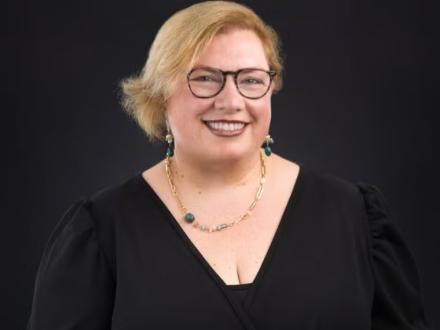
Meet a researcher working on untangling housing titles
Laura McNally
Associate Dean for Experiential Education, School of Law
Director, Milton and Charlotte Kramer Law Clinic, School of Law
Area of Focus: poverty law, disability rights, children’s rights, health law and interdisciplinary education.
Laura McNally wants a better way to talk about estate planning, inheritance, and senior homeownership—issues often fraught with emotion. The “end-of-life” conversation is often taboo.
“The trick is to make these conversations less about death, and more about agency, stability and choice,” she said. “If you talk to someone about the options, you affirm that they have a say in the future of what matters most: their home, their legacy, their care.”
McNally emphasizes that seniors’ property titles and homeownership involve far more than just deciding who inherits belongings after someone dies.
“Not having clear ownership of a home can block access to critical resources, like city grants, home repair programs and tax relief, that help people age safely and comfortably in place,” she says. “Even environmental issues, like lead abatement, often require a clear title to qualify for funding.”
For McNally, this work is deeply personal. Her mother, a longtime advocate for seniors, passed away ten years ago without a will.
“It struck me,” she said, “that here was a woman who had pamphlets and information about legal planning for others, such as advance healthcare directives, wills, powers of attorney, but she never took care of it for herself.”
McNally was first drawn into the complex and often invisible world of heirs’ property and tangled titles through her work in the Health Law Clinic’s Wills Pop-Up Clinics. These community-based events pair law students with local residents to draft essential documents like simple wills, healthcare directives and powers of attorney.
At these clinics, which are held regularly throughout the academic year, McNally and her students began to notice a recurring pattern of tangled titles, situations where the legal ownership of a property doesn’t reflect its current occupants, often due to unresolved inheritances or missing documentation.
Around the same time, Debbie Wilber, associate director at the Mandel School’s National Initiative on Mixed-Income Communities, approached the Law School’s Milton and Charlotte Kramer Law Clinic seeking community partners to help address the tangled title problem.
That outreach sparked collaborations with community anchors such as Local Initiatives Support Corporation (LISC), Fatima Family Center, East End Neighborhood Center and Burten, Bell, Carr Development, Inc.
“Along the way, what became evident was a clear gap in data and information,” McNally says. “We knew it was a problem, but how many people are impacted? If we invest in solutions, how much change can we expect? These questions kept surfacing, but we didn’t have the numbers to back up the lived reality.”
In recognition of this work, McNally was recently named a Bellow Scholar. Her project, “Examining the Impact of ‘Tangled Titles’ on Housing Stability, Wealth Preservation, and Aging in Place in Urban Cities,” aims to answer exactly those questions. Focused on northern industrial cities like Cleveland, her study will explore how tangled titles affect outcomes for aging residents, particularly in communities historically marginalized by redlining and systemic disinvestment.
Over the next year, she plans to release a white paper analyzing the scope of the issue and highlighting practical strategies for intervention.
“Like so many entrenched social problems, there’s no one-size-fits-all solution,” McNally says. “But what we do know is that preventing tangled titles before they happen is a lot easier, and less costly, than untangling them later.”
That means focusing on early, accessible, community-based legal tools. McNally envisions a multi-pronged approach that includes proactive estate planning, outreach around property records and partnerships with neighborhood-based service providers.
“I like being able to work on both the policy level and with individual clients,” she says. “You get a clearer view of how systems work and what real change might look like.”




